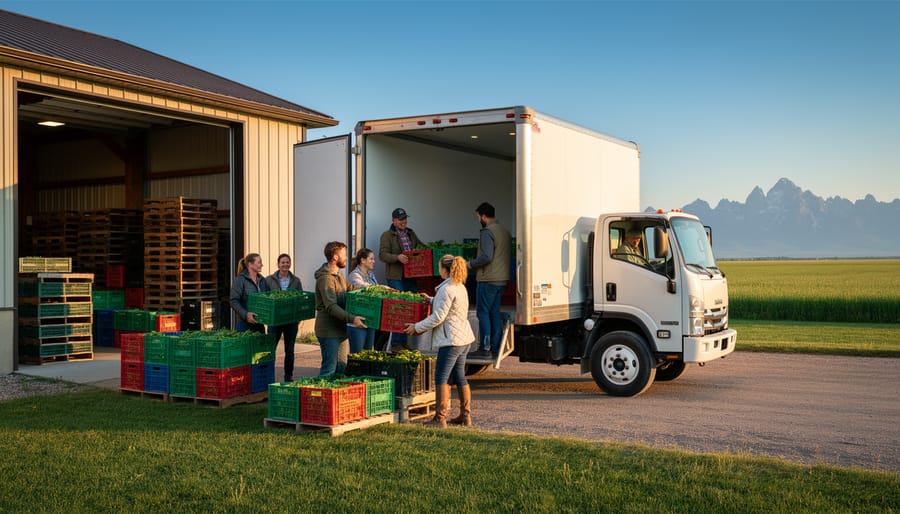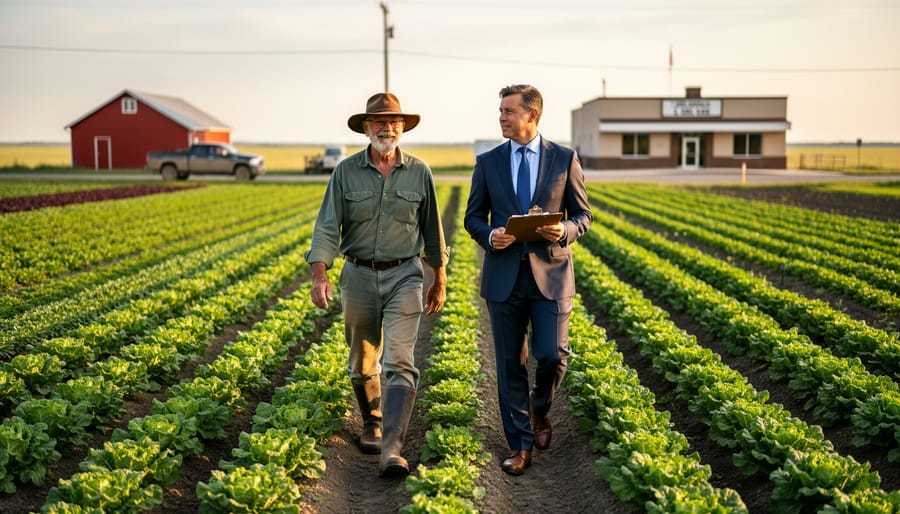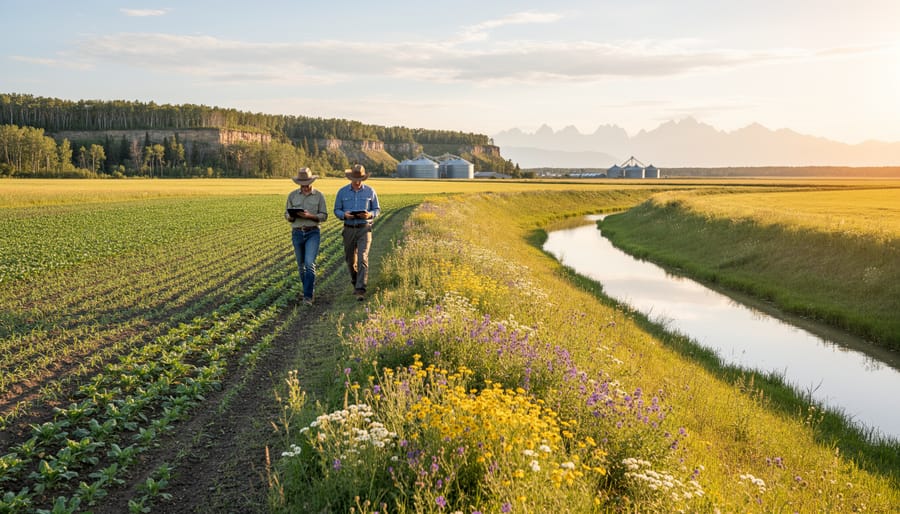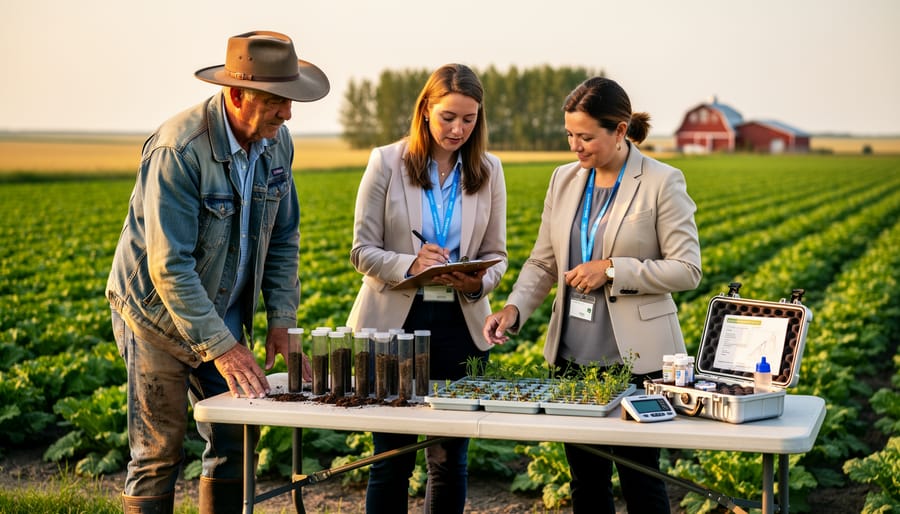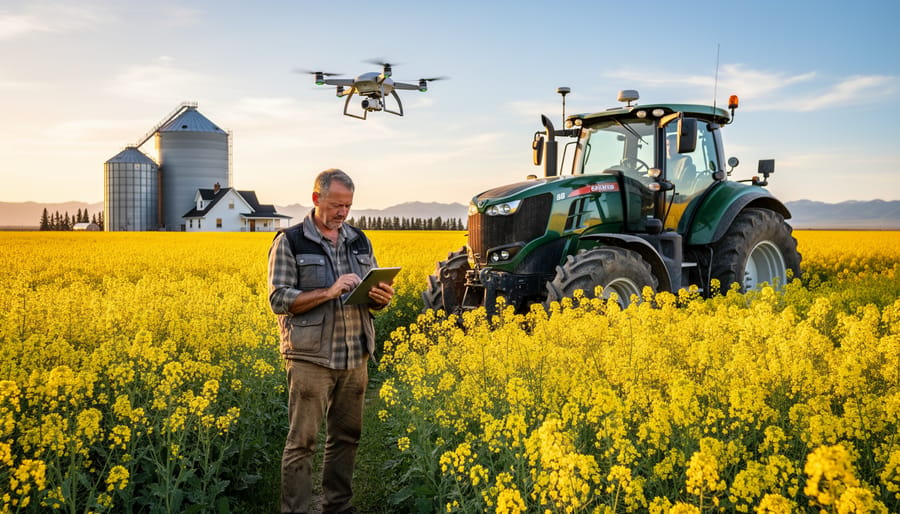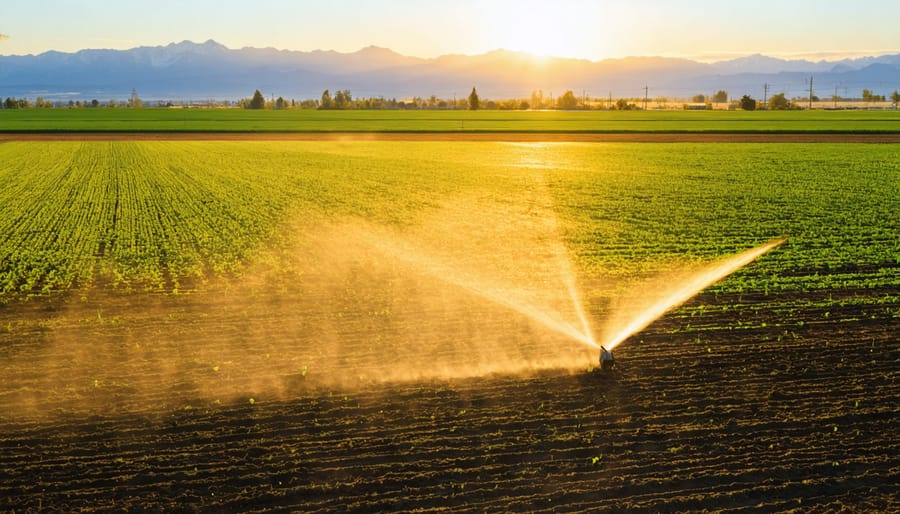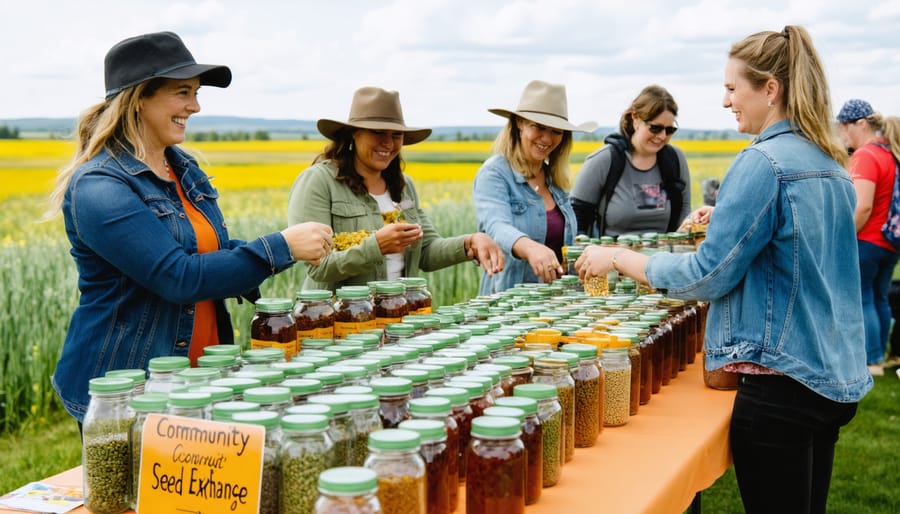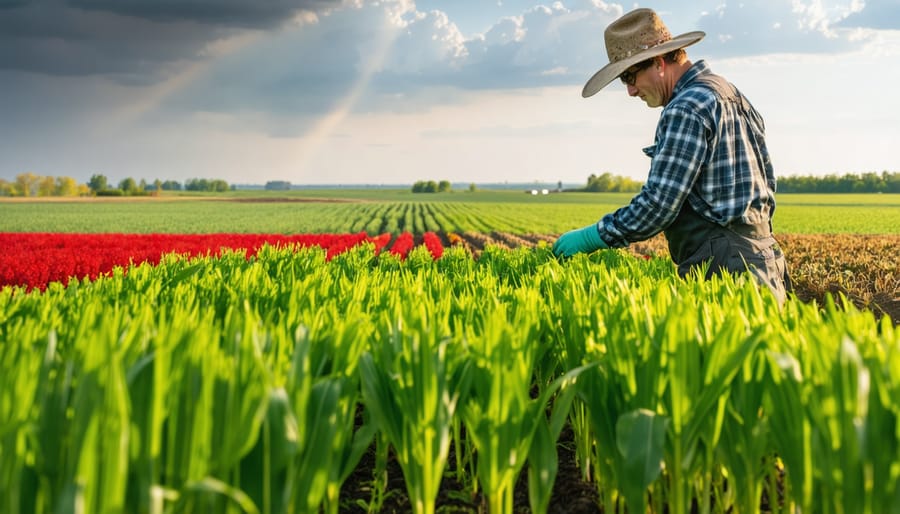Transforming Canadian agriculture through technology partnerships has become a cornerstone of sustainable farming practices, with pioneering initiatives demonstrating unprecedented success across Alberta’s agricultural landscape. Smart technology adoption in Alberta has reduced water consumption by 40% while increasing crop yields by 25% through precision irrigation systems and soil monitoring networks. This collaborative approach brings together local farmers, tech innovators, and agricultural researchers to develop practical, scalable solutions that respect both environmental stewardship and economic viability. By sharing data, resources, and expertise across farming communities, these partnerships have created a sustainable model that’s not only preserving our natural resources but also strengthening rural economies. The measurable impacts of these initiatives – from reduced chemical inputs to improved soil health – demonstrate how technology cooperation isn’t just an option for sustainable development; it’s becoming the foundation of modern agricultural resilience.
The Power of Digital Farm Networks in Alberta
Smart Soil Monitoring Networks
In central Alberta, a network of over 200 farmers has revolutionized their agricultural practices through collaborative soil health monitoring practices. Using interconnected soil sensors, these farmers share real-time data about moisture levels, nutrient content, and soil temperature across their properties. This cooperative approach has reduced water usage by 30% and optimized fertilizer application across participating farms.
The network, established in 2019, enables farmers to make data-driven decisions through a shared digital platform. Each participating farm contributes to a growing database that helps predict optimal planting times and resource needs. Local farmer Sarah Thompson reports, “By sharing our soil data, we’ve created a support system that helps us all farm more efficiently while protecting our soil’s future.”
The initiative has resulted in a 25% reduction in input costs and improved crop yields by an average of 15%. More importantly, it has fostered a culture of knowledge sharing and collaborative problem-solving among Alberta’s farming community, demonstrating how technology can strengthen both environmental stewardship and rural communities.

Collaborative Weather Tracking Systems
In the heart of Alberta’s farming communities, collaborative weather tracking systems have revolutionized how farmers manage their resources and plan their operations. Local farmers, working alongside meteorological experts, have established a network of smart weather stations that share real-time data across participating farms. These systems collect crucial information about rainfall patterns, soil moisture levels, and frost warnings, enabling farmers to make informed decisions about irrigation scheduling and crop protection.
A notable success story comes from the Red Deer County initiative, where 50 connected weather stations now serve over 200 farms. This cooperation has resulted in a 30% reduction in water usage and a 25% decrease in crop losses due to adverse weather conditions. Farmers receive automated alerts through their smartphones, allowing them to respond quickly to changing weather patterns.
The system’s success lies in its community-driven approach, with farmers contributing their local knowledge while benefiting from shared technological resources. Data collected is also used to create regional climate models, helping agricultural communities adapt to changing weather patterns while maintaining sustainable farming practices. This collaborative approach demonstrates how shared technology can strengthen agricultural resilience while promoting environmental stewardship.
Cross-Industry Innovation Partnerships

Precision Agriculture Alliances
In Alberta’s farming communities, the emergence of precision agriculture partnerships has revolutionized traditional farming practices. These alliances between farmers and technology providers are driving digital transformation in rural farming while promoting sustainable development.
Local farmers like Mike Thompson from Red Deer County have partnered with AgTech startups to implement smart irrigation systems that reduce water usage by 30%. Using soil moisture sensors and weather data integration, these systems optimize water distribution across fields, saving both resources and operational costs.
The Precision Agriculture Cooperative of Southern Alberta exemplifies this collaborative approach, connecting over 200 farmers with technology providers. Members share data and insights through a centralized platform, helping optimize seeding rates, fertilizer application, and harvest timing. This community-driven initiative has resulted in a 25% reduction in input costs while maintaining or improving yields.
Equipment manufacturers are also joining forces with farmers to develop and test new sustainable technologies. John Bergen, who farms 2,000 hectares near Lethbridge, works with machinery companies to pilot autonomous tractors equipped with precision spraying technology, reducing pesticide use by 40% through targeted application.
These partnerships demonstrate how collaboration between farmers and tech providers creates practical, sustainable solutions that benefit both the agricultural community and the environment.
Research Institution Collaboration
The collaboration between Canadian farms and research institutions has emerged as a cornerstone of agricultural innovation in Alberta. The Lethbridge Research and Development Centre, partnering with local farmers, has pioneered sustainable farming techniques that combine traditional knowledge with cutting-edge technology. Through these partnerships, farmers gain direct access to soil health monitoring systems and precision agriculture tools, while researchers receive valuable real-world feedback on their innovations.
A notable example is the Smart Farm initiative at Olds College, where researchers work alongside farmers to test and implement sustainable irrigation systems. This program has helped reduce water usage by 30% while maintaining crop yields. Farmers participating in these collaborations report significant improvements in resource efficiency and crop resilience.
The University of Alberta’s Faculty of Agricultural, Life & Environmental Sciences has established a network of demonstration farms across the province. These living laboratories allow farmers to witness sustainable practices firsthand and participate in developing locally adapted solutions. Through regular field days and workshops, knowledge sharing becomes a two-way street between researchers and producers.
These partnerships have proven particularly effective in developing climate-smart farming techniques. For instance, collaborative research on drought-resistant crop varieties has helped Alberta farmers maintain productivity despite increasingly challenging weather conditions. The success of these programs demonstrates how structured cooperation between academic institutions and farming communities can drive sustainable agricultural innovation forward.
Community-Driven Tech Solutions
Open-Source Farm Management Tools
The rise of open-source farm management tools has revolutionized how Canadian farmers collaborate and share technological solutions. Notable examples include FarmHack, a community-driven platform where Alberta farmers contribute to and benefit from shared equipment designs and software solutions. These collaborative tools help farmers track crop rotation, monitor soil health, and manage irrigation systems more effectively.
In the Prairie provinces, farmer-led initiatives have developed apps for pest monitoring and yield prediction, freely available to all community members. The University of Alberta’s Digital Agriculture Lab partners with local farmers to create and refine these tools, ensuring they meet real-world needs while remaining accessible to everyone.
A successful case study from Red Deer County shows how a group of organic farmers collectively developed a soil monitoring system that’s now used by over 200 farms across Alberta. This system helps track soil organic matter, moisture levels, and nutrient content, leading to a 30% reduction in fertilizer use while maintaining crop yields.
These collaborative projects demonstrate how shared knowledge and open-source technology can make sustainable farming practices more accessible and economically viable for Canadian farmers, fostering a culture of innovation and community support in agricultural communities.
Equipment Sharing Programs
Equipment sharing programs across Alberta have revolutionized sustainable farming by leveraging digital platforms to connect farmers with essential machinery. Through smartphone apps and web portals, farmers can now easily locate and reserve equipment within their communities, significantly reducing individual capital investment while maximizing resource utilization.
The Southern Alberta Equipment Share Network, launched in 2021, demonstrates this cooperation in action. The program connects over 200 farmers who share specialized harvesting and seeding equipment, resulting in a 40% reduction in equipment costs for participating farms. Through blockchain-based scheduling and smart contracts, the system ensures fair access and transparent usage tracking.
Calgary-based farmer Sarah Thompson shares, “Before joining the network, I couldn’t justify purchasing a $300,000 precision seeder for my operation. Now, five of us share one, and it’s transformed how we manage our seeding schedule.”
These programs particularly benefit new farmers, enabling them to access modern technology without overwhelming startup costs. The model has proven so successful that similar initiatives are emerging across Saskatchewan and Manitoba, creating a broader network of resource-sharing communities focused on sustainable agricultural practices.
Mobile maintenance teams support these programs, ensuring equipment is properly serviced between uses and maintaining high operational standards.
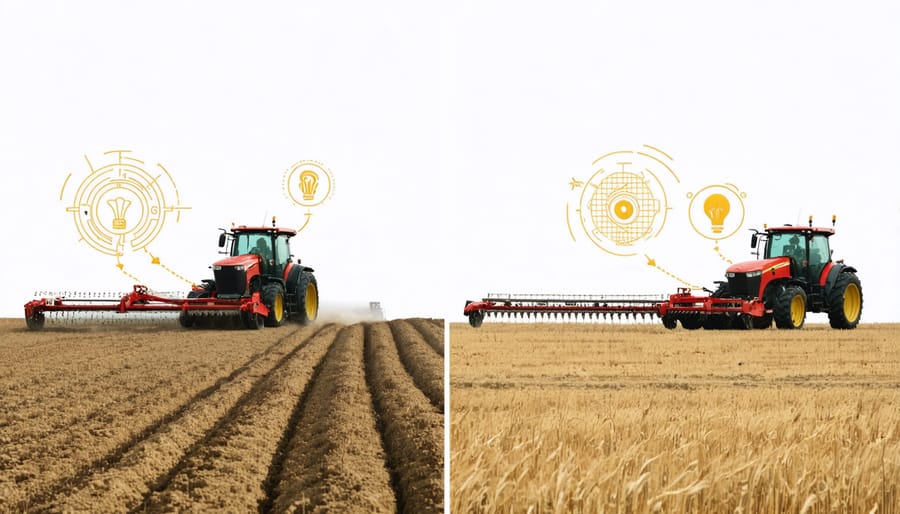
Measuring Success: Environmental and Economic Impact
The impact of technology cooperation initiatives in Alberta’s agricultural sector has yielded impressive measurable results. Recent data from the Prairie Agricultural Machinery Institute shows a 25% reduction in water usage across participating farms through smart irrigation systems. These systems, implemented through partnerships between local farmers and tech companies, have saved an average of 15 million litres of water per growing season per farm.
Economic benefits have been equally significant. Farmers participating in cooperative precision agriculture programs report an average 18% increase in crop yields and a 20% reduction in input costs. The Alberta Agricultural Technology Network reports that farms using shared data platforms and equipment have seen their operational efficiency improve by 30% over three years.
Environmental monitoring has revealed encouraging trends. Soil health assessments show a 40% increase in organic matter content on farms using regenerative techniques learned through technology sharing programs. Carbon footprint measurements indicate a 35% reduction in greenhouse gas emissions where smart farming practices have been adopted.
The community impact extends beyond individual farms. Local agricultural cooperatives using shared technology platforms have created 150 new jobs in rural areas. The knowledge-sharing network has connected over 1,000 farmers across Alberta, leading to a 45% increase in sustainable practice adoption rates.
Cost-sharing initiatives for advanced agricultural technology have resulted in an average return on investment of 2.5:1 within the first two years. These programs have helped smaller farms access equipment and expertise that would otherwise be out of reach, promoting inclusive growth and sustainable development across the agricultural sector.
The success of sustainable development through technology cooperation in Canadian agriculture demonstrates the power of collaborative innovation. By sharing knowledge, resources, and technological solutions, our farming communities have shown remarkable progress in reducing environmental impact while maintaining productivity. The partnerships between agricultural tech companies, research institutions, and local farmers have created a blueprint for future sustainable farming practices.
Looking ahead, we can expect to see even more advanced solutions emerging from these cooperative efforts. Smart farming technologies, precision agriculture, and data-sharing platforms will continue to evolve, offering new opportunities for sustainable growth. The key to success lies in maintaining strong community connections and ensuring that technological advancements remain accessible to farms of all sizes.
As we move forward, the focus should remain on practical, scalable solutions that benefit both the environment and farm operations. By continuing to embrace collaborative approaches and remaining open to new innovations, Canadian farmers are well-positioned to lead the way in sustainable agricultural practices. Together, we can build a more resilient and environmentally conscious farming future for generations to come.


